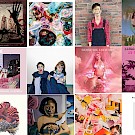 Back: Neka Perini (Neka & Kahlo), Justin Cory (Usnea), Mila Kokich (Neka & Kahlo), Nathan Carson (Witch Mountain), Mikey Fountaine, Josh Hughes (Rabbits); Front: Rasheed Jamal, Mac Smiff (We Out Here Magazine)
Back: Neka Perini (Neka & Kahlo), Justin Cory (Usnea), Mila Kokich (Neka & Kahlo), Nathan Carson (Witch Mountain), Mikey Fountaine, Josh Hughes (Rabbits); Front: Rasheed Jamal, Mac Smiff (We Out Here Magazine)
Portland: Where young people go to retire.
Or maybe not retire, but rather live out their DIY dreams, right? Where backyard brewers, boutique bicycle makers and basement bands flourish. Where the creative class is consistently keeping it weird.
That’s the Portland brand. That’s the perception the rest of the world has of Portland. Problem is, this perception isn’t wholly accurate. Yes, we do all of those things and, yes, the stereotypes exist because there’s truth to them; but if you flip the coin over, there’s something on the other side. A different reality—many diverse realities, in fact.
Lately, Portland is sold as sounding like The Decemberists, Modest Mouse, Pink Martini and Storm Large, Blind Pilot, Sleater-Kinney and Portugal. The Man. But if you’re familiar with the music scene (or even the aforementioned artists), you’ve always known that Portland doesn’t have a sound. There are many sounds and many thriving scenes—creatively, that is.
“We have plenty of artists here, we have lots of bands moving here, lots of bands being formed here, groups forming out of the ashes of old groups or interesting combinations of existing groups. We have plenty of record labels that are making interesting things, we have venues that are packed throughout the week,” lists Theo Craig, a man of many hats including talent buyer, DJ, bassist in Máscaras and, most recently, XRAY.fm’s music programming director.
Thriving, right?
“On the financial side, maybe no,” Craig laughs, “especially in the local scene. For the local live music scene, it doesn’t seem like people are really that willing to part with their dollars to see artists from their town.”
 This isn’t news. Artists have struggled since the beginning of time. It’s a lifestyle choice—one that’s abundant in Portland, a city accommodating to the lifestyle, which, when we circle back around, is why the music scene is thriving—creatively.
This isn’t news. Artists have struggled since the beginning of time. It’s a lifestyle choice—one that’s abundant in Portland, a city accommodating to the lifestyle, which, when we circle back around, is why the music scene is thriving—creatively.
But not all scenes are created equal. And traditional institutions—major record labels, the press, radio stations, and even local government—play a role in bolstering or suppressing scenes. Certain music and styles are more palatable than others, more commercially viable, more socially acceptable—in the eyes and ears of the gatekeepers.
While the city-sanctioned Decemberists Day in January was surely a special moment for many involved, it was also a blatant publicity stunt to promote a new record. Done right (and it was), it was a powerful move: Portland’s most beloved and recognized literary folk rockers rubbed elbows with city officials and performed a free set at City Hall. It was the perfect epitomization of the Portland brand—like a scene out of Portlandia.
Now, Mayor Charlie Hales has invited hip-hop into City Hall, declaring October 15 as Hip-Hop Day, to mixed reception from the scene’s players. The two entities have a less than positive history and some influential voices are rightfully wary of his motives—another timely bid for political support? Some see it as a step forward; others as an opportunity to speak out on a stage where they’ll be heard.
 Rapper Glenn Waco and metal bassist Haley Westeiner of Eight BellsThe recognition and public stage is positive. But with or without it, scenes will find ways to sustain themselves—it’s why the music scene is thriving here, even if not financially. Scenes are fluid beasts of humanity and there’s strength in numbers. But they do require support.
Rapper Glenn Waco and metal bassist Haley Westeiner of Eight BellsThe recognition and public stage is positive. But with or without it, scenes will find ways to sustain themselves—it’s why the music scene is thriving here, even if not financially. Scenes are fluid beasts of humanity and there’s strength in numbers. But they do require support.
“You don’t have to be an artist to make art,” says Aaron Colter of underground documentary crew and record label Banana Stand Media. You can be a part of the process, both Craig and Colter say, by showing up at shows, engaging with artists and, most importantly, paying for art.
“If you care about the music scene, then you should support it,” Craig urges. “And you should support it with your money.”
If you make a conscious effort, “You’d be surprised how much money you can find slowly over time to support artists to create things that you enjoy,” Colter says.
While artists will continue to struggle on a multitude of levels, cross-pollination is still strong in Portland—from mixed bills at live shows to collaborative projects and a general spirit of openness that’s been consistently robust in Portland. As much as a stereotypical brand is sold to the world and ourselves, the Portland music scene doesn’t just fit in a nice, neat Portlandia-sized box.
From hip-hop to heavy metal, read on to explore two vibrant underground scenes that will show you the difference between what’s sold and what’s real. Whether you’re part of a scene that feels like it’s being squeezed out of its old haunts, or part of one that’s simply seeking a public stage and equal treatment in the first place, these two scenes may be feeling the pressure, yet they’re stronger than ever. Find out what it means to go from surviving to thriving—and maybe, one day sold as Portland.










